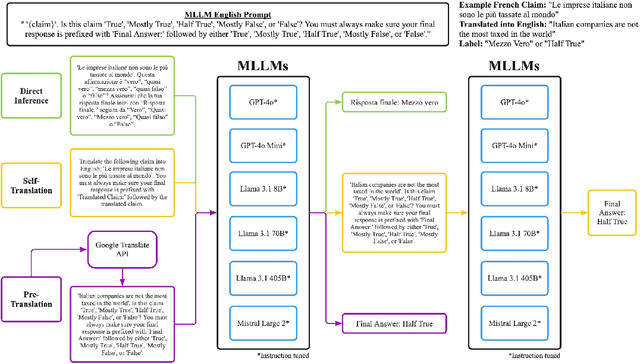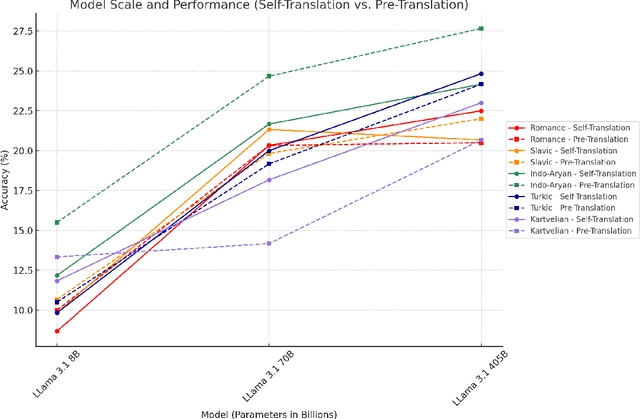Gary Sun
A Comparative Study of Translation Bias and Accuracy in Multilingual Large Language Models for Cross-Language Claim Verification
Oct 14, 2024



Abstract:The rise of digital misinformation has heightened interest in using multilingual Large Language Models (LLMs) for fact-checking. This study systematically evaluates translation bias and the effectiveness of LLMs for cross-lingual claim verification across 15 languages from five language families: Romance, Slavic, Turkic, Indo-Aryan, and Kartvelian. Using the XFACT dataset to assess their impact on accuracy and bias, we investigate two distinct translation methods: pre-translation and self-translation. We use mBERT's performance on the English dataset as a baseline to compare language-specific accuracies. Our findings reveal that low-resource languages exhibit significantly lower accuracy in direct inference due to underrepresentation in the training data. Furthermore, larger models demonstrate superior performance in self-translation, improving translation accuracy and reducing bias. These results highlight the need for balanced multilingual training, especially in low-resource languages, to promote equitable access to reliable fact-checking tools and minimize the risk of spreading misinformation in different linguistic contexts.
LightSim: Neural Lighting Simulation for Urban Scenes
Dec 11, 2023Abstract:Different outdoor illumination conditions drastically alter the appearance of urban scenes, and they can harm the performance of image-based robot perception systems if not seen during training. Camera simulation provides a cost-effective solution to create a large dataset of images captured under different lighting conditions. Towards this goal, we propose LightSim, a neural lighting camera simulation system that enables diverse, realistic, and controllable data generation. LightSim automatically builds lighting-aware digital twins at scale from collected raw sensor data and decomposes the scene into dynamic actors and static background with accurate geometry, appearance, and estimated scene lighting. These digital twins enable actor insertion, modification, removal, and rendering from a new viewpoint, all in a lighting-aware manner. LightSim then combines physically-based and learnable deferred rendering to perform realistic relighting of modified scenes, such as altering the sun location and modifying the shadows or changing the sun brightness, producing spatially- and temporally-consistent camera videos. Our experiments show that LightSim generates more realistic relighting results than prior work. Importantly, training perception models on data generated by LightSim can significantly improve their performance.
 Add to Chrome
Add to Chrome Add to Firefox
Add to Firefox Add to Edge
Add to Edge